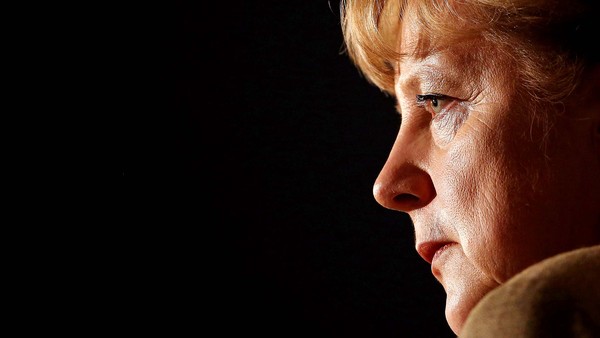To the astonishment of almost everyone in the room, Angela Merkel began to cry.
“Das ist nicht fair.” That is not fair, the German chancellor said angrily, tears welling in her eyes. “Ich bringe mich nicht selbst um.” I am not going to commit suicide.
For those who witnessed the breakdown in a small conference room in the French seaside resort of Cannes, it was shocking enough to watch Europe’s most powerful and emotionally controlled leader brought to tears.
But the scene was even more remarkable, those present said, for the two objects of her ire: the man sitting next to her, French President Nicolas Sarkozy, and the other across the table, US President Barack Obama.
It would be the low point in a brutal, recrimination-filled night, one many participants would recall as the nadir of the three-year eurozone crisis. Mr Sarkozy had hoped his leadership of the Group of 20 summit would cement his standing on the global stage en route to re-election. Instead, everything was falling apart.
Greece was imploding politically; Italy, a country too big to bail out, appeared just days away from being cut off from global financial markets; and Ms Merkel, try as Mr Sarkozy and Mr Obama might, could not be convinced to increase German contributions to the eurozone’s “firewall” – the “big bazooka” or “wall of money” they believed had to grow dramatically to fend off attacks by panicking bond traders.
Instead, a cornered Ms Merkel threw the French and American criticism back in their faces. If Mr Sarkozy or Mr Obama did not like the way her government ran, they had only themselves to blame. After all, it was their allied militaries that had “imposed” the German constitution on a defeated wartime foe six decades earlier.
“It was the point where clearly the eurozone as we know it could have exploded,” said a member of the French delegation at Cannes. “It was the feeling [that with] the contagion, at this point, you were on the brink of explosion.”
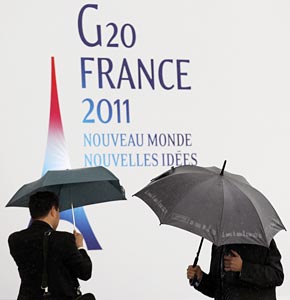 ©Bloomberg
©Bloomberg
Taking cover: officials seek shelter ahead of a stormy G20 in Cannes
And yet less than a year after that November 2011 night, the existential crisis for Europe’s single currency would, for all intents and purposes, be over. The markets that once threatened to tear the euro apart would be tamed and the seemingly endless series of all-night emergency summits would come to an end.
When the history of the eurozone crisis is written, the period from late 2011 through 2012 will be remembered as the months that forever changed the European project. Strict budget rules were made inviolable; banking oversight was stripped from national authorities; and the printing presses of the European Central Bank would become the lender of last resort for failing eurozone sovereigns.
Next week, European voters will go to the polls to render a verdict on what EU leaders created over those 12 months. If opinion polling is any indication, their judgment will be harsh: anti-EU parties are poised for unprecedented gains from France to Finland, Athens to Amsterdam.
Over the course of the past six months, the Financial Times has interviewed dozens of participants in those decisions to tell the full story of how this new eurozone was created. From mid-level bureaucrats to prime ministers, they tell an unsettling tale of accidents, near misses and seemingly foolhardy brinkmanship. But in the end, these same leaders appear to have prevailed. The euro has been saved. The Europe they have created, for good or for ill, will be their legacy.
‘I hope he’s told Merkel’
As with nearly everything in the eurozone crisis, it started in Greece.
George Papandreou, the lanky scion of Greece’s most famous political dynasty, had returned to Athens from one of the most consequential EU crisis summits to find his country in upheaval. On October 27 in Brussels, he had agreed to the largest sovereign default in history – a €200bn debt restructuring that cut what Athens owed private bondholders in half. But at home, he was being vilified.
‘I realised the situation was getting out of control.’– George Papandreou
For the son and grandson of Greek prime ministers arrested on the same night by a military junta in 1967 – Mr Papandreou can still recall arming himself aged 14 with a double-barrelled shotgun when authorities arrived at his childhood home – what happened the day after his return from Brussels was particularly unnerving.
During a military procession in Thessaloniki to mark the anniversary of Greece’s entry into the second world war, thousands of anti-austerity protesters, including rightwing radicals and anarchists, stormed the parade route, forcing Karolos Papoulias, Greece’s president, to flee. Mr Papandreou would later tell his fellow prime ministers he felt the incident was a sign his country was on the verge of another coup.
“Everybody was saying that the government are traitors,” Mr Papandreou recalled. “I realised the situation was getting out of control.”
That weekend, he gathered a small group of advisers and unveiled his plan: he would call a national referendum on the new €172bn bailout programme. Those criticising the agreement, including opposition leader Antonis Samaras and rebels within his own party, would be forced to pick sides, Mr Papandreou reasoned, and most would back the rescue – particularly since without EU bailout funds, disorderly default and euro exit was the likely outcome. Victory would give him the mandate for the reforms that bailout lenders were demanding.
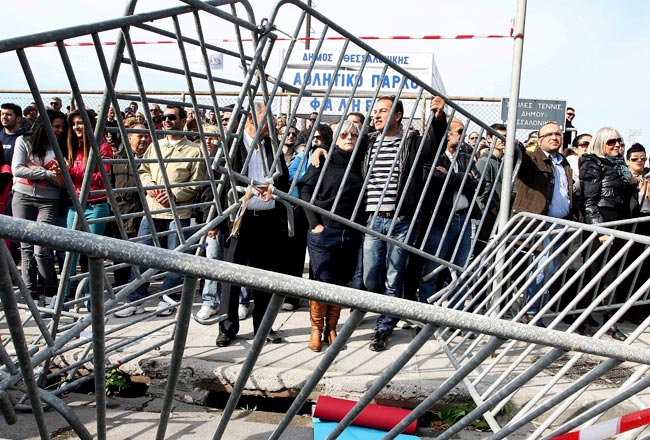 ©EPA
©EPA
Angry response: thousands of anti-austerity protesters stormed a parade route in Thessaloniki after the bailout was announced
But Mr Papandreou did not consult outside his tightly knit inner circle. Instead, he presented his plan as a fait accompli to parliamentarians from his centre-left Pasok party the following evening. Those in the room were in shock, including Evangelos Venizelos, Mr Papandreou’s finance minister. “On Sunday evening, during our last meeting in person, in private, Papandreou [spoke] only on a proposal of [a vote of] confidence, not at all about the referendum,” Mr Venizelos said, adding that he suffered acute abdominal pains in the following hours, forcing him to go to hospital. “This was the result, the medical result, of the stress.”
Others had a different, non-medical worry. “I remember the first thing that went through my mind: ‘I hope he’s told Merkel,’” said one minister.
Mr Papandreou later claimed he had tipped off fellow EU leaders. Some acknowledge vague recollections but others remember nothing. “I never took it seriously,” said a fellow leader. “It sounded a little bit desperate.”
So when Mr Sarkozy learnt that Mr Papandreou had decided to put their carefully crafted bailout deal up for a vote, he exploded. “He was ballistic,” said an aide. “He was ballistic.”
Eurozone bond markets, which had briefly rallied after the Greek debt restructuring was agreed, sold off in a panic. Yields on Greece’s benchmark 10-year bond spiked by 16.2 per cent in a single day. More worryingly, borrowing costs for bigger eurozone governments began to approach levels where others had been forced into bailouts: yields on Italy’s 10-year bond jumped to more than 6.2 per cent.
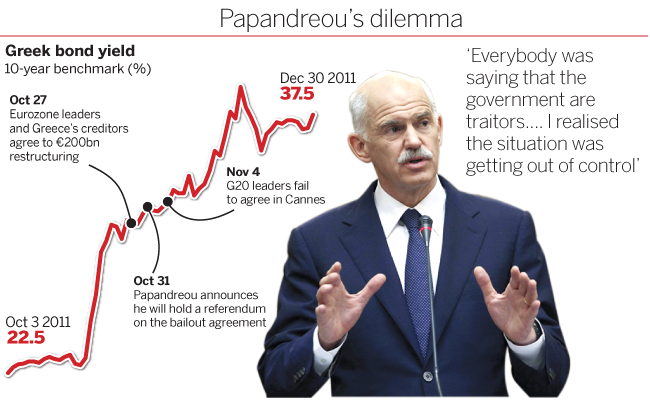
She was torn over Grexit
Mr Sarkozy summoned his closest advisers for an emergency meeting at the Elysée Palace. According to a person in the room, the French president’s initial reaction was to force Mr Papandreou to reverse course: that either he accept the new bailout conditions immediately or Greece would be forced out of the euro.
But Henri Guaino, a Sarkozy confidant and speech writer, noted Charles de Gaulle himself preferred referendums to parliamentary politics. Asking Mr Papandreou to cancel a plebiscite would go against their Gaullist traditions, he argued. So Mr Sarkozy came up with a compromise: Mr Papandreou could go ahead with a referendum – but not on the bailout.
Mr Sarkozy called Ms Merkel and agreed a strategy. They would summon Mr Papandreou to Cannes, where the G20 was to get under way in just 48 hours, and persuade him to hold a referendum on whether Greece would remain in the eurozone.
‘For Merkel, a key issue was whether the Greeks themselves wanted to be in or out’– German official
In Berlin, Ms Merkel was torn over the issue of “Grexit”, with several advisers – particularly Wolfgang Schäuble, her powerful finance minister – arguing that it would bind the 16 remaining eurozone members more closely, allowing them to pull themselves out of the crisis.
“She was very keen on it being a clear ‘in or out’ question,” said a German official. “For her . . . a key issue was whether the Greeks themselves wanted to be in or out, and if there would have been a referendum and the Greeks would have decided that they want out, that would have made the path easier.”
Many EU officials still wonder why Mr Papandreou agreed to show up in Cannes to be hauled over the carpet. While he was stunned by the outpouring of anger from EU leaders that Tuesday morning, the Greek prime minister said he relished the chance to win international support for his referendum idea on a global stage.
Although famous for hosting the glamorous Cannes Film Festival, the Palais des Festivals is a charmless hulk of stone and glass jutting into the Mediterranean. In an effort to give the Palais’ long, beige halls some panache for the G20 summit, French organisers decorated them with fluorescent green bunting and carpets. But a chilly drizzle cast a pall over the meetings. Soon the carpets began turning a muddy brown.
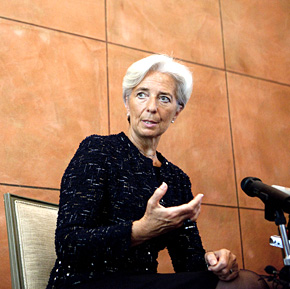 ©Bloomberg
©Bloomberg
Helping hand: Christine Lagarde, IMF managing director, offered Italy an €80bn line of credit
Mr Sarkozy summoned his fellow leaders to the Palais at 5.30pm on Wednesday, an hour before they were due to meet Mr Papandreou, to agree on how to confront him. Those invited included Ms Merkel; Jean-Claude Juncker, the Luxembourg prime minister who chaired the eurogroup of finance ministers; Christine Lagarde, managing director of the International Monetary Fund; and the EU’s two presidents, José Manuel Barroso and Herman Van Rompuy.
When the group assembled in a small, bland conference room, seated on rococo Louis XV chairs around a long table, Mr Sarkozy passed around a single sheet, titled “Position commune sur la Grèce” – common position on Greece. “The idea was to put Papandreou against the wall, in the corner,” said one person in the room.
‘Italy has no credibility’
Mr Sarkozy’s six-point plan, obtained by the FT, was clear and tough: Mr Papandreou must accept the bailout plan agreed the week before, and no further aid would be forthcoming until his parliament voted its assent.
“We are always ready to help Greece, despite the unilateral decision to announce [the referendum] without any prior notification,” point two read, a clear reflection of Mr Sarkozy’s anger. Point six was clearest of all: “The referendum shall be only on the membership of Greece in the euro area and the European Union.”
Mr Papandreou would later claim it was primarily Mr Sarkozy who fought with him to change the referendum’s wording to “in or out” of the euro, and that Ms Merkel was on his side. But those in the room said there was little dissent from any of the leaders, including the German chancellor.
‘The idea was to put Papandreou against the wall, in the corner.’
With the Greek lines agreed, Mr Sarkozy turned to the subject weighing more heavily on their minds: Italy. Mr Papandreou’s referendum had created a dilemma for Greece but it also gave rise to a much greater fear that contagion from Athens would spread across the eurozone. No country posed more of a contagion danger than Italy.
With nearly €2tn in sovereign debt – the fourth-largest debt pile in the world – Italian finance ministry officials estimated a three-year bailout programme would cost about €600bn. There was not enough money in the EU or IMF to foot that bill. Italy was simply too big to bail.
“We could not afford Italy,” said a French finance ministry official. “No one could afford Italy, so that was the end probably of the eurozone.”
Ms Lagarde arrived in Cannes with a plan to put Italy into an €80bn “precautionary programme”, a line of credit that could be used in emergency but would also come with intensive monitoring to ensure Silvio Berlusconi, the Italian prime minister who had lost the confidence of his EU peers, would implement economic reforms. Only then, she argued, would markets begin lending again at sustainable rates. “Italy has no credibility,” Ms Lagarde told the group.
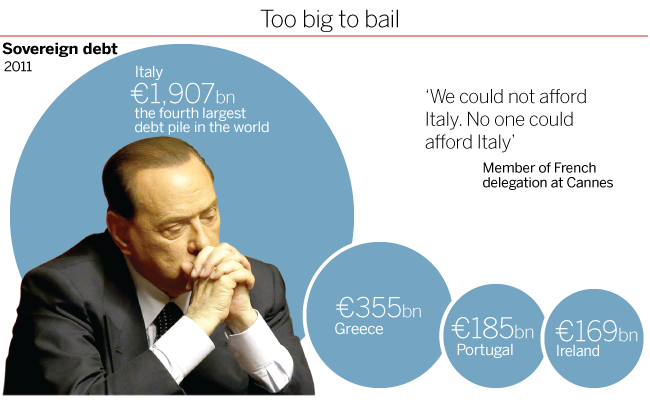
But any Italian decision would have to wait. Mr Papandreou was about to arrive.
‘The full Sarkozy’
The meeting would leave many participants shell-shocked. In his journal, François Baroin, Mr Sarkozy’s finance minister, would call it “psychological warfare”. Others, particularly the EU’s two presidents, would later tell associates they were extremely uncomfortable with a small group of European leaders forcing the hand of the elected prime minister of a sovereign country. “For me, I have never seen a meeting so tense and so difficult,” said another aide.
Once Mr Papandreou and Mr Venizelos arrived in the conference room, Mr Sarkozy began what one official called “the full Sarkozy”: a pointed, angry denunciation of Mr Papandreou’s referendum decision.
“Clearly the feeling was: We’ve done everything to help you, we’ve done everything to keep you in the eurozone, we’ve taken financial, political risk,” said a member of France’s delegation. “It’s the biggest debt restructuring in the world, ever, and now what you do is you betray us.”
‘The position of Sarkozy was very offensive. It was not polite. Very, very strong and very offensive’– Evangelos Venizelos
Mr Papandreou was taken aback. “He goes there and he starts ranting and raving on the referendum,” he said of Mr Sarkozy. Added Mr Venizelos: “The position of Sarkozy was very offensive. It was not polite. Very, very strong and very offensive, in order to put Greece in a dilemma: in or out.”
The Greeks attempted to fight back. Mr Papandreou laid out his plan: the referendum would be in a month’s time, and it would force Mr Samaras and his own Pasok rebels to fall into line, since even his most virulent mainstream critics could not oppose the country’s only lifeline to staying in the eurozone. Then Mr Papandreou read his proposed wording for the referendum. “I had a slightly long paragraph,” Mr Papandreou conceded.
Ms Merkel was the first to respond, and she was not happy. “We either solve this among ourselves here, or we will fail in the eyes of the world,” she said. “Wir müssen entscheiden” – we must decide. “Either you want to stay in the euro or go out.”
Those in the room said Mr Papandreou visibly deflated as the fight continued. As he fatigued, Mr Venizelos took up the battle, a sign many saw as the sudden realisation by the Greek prime minister that he had become a spent political force – and Mr Venizelos, who had long coveted the premiership, was moving to exploit the change in circumstances.
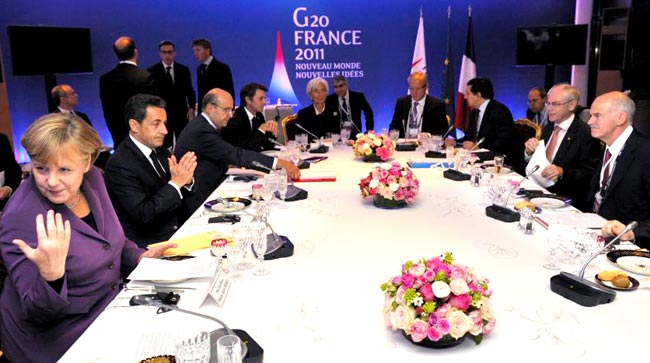 ©AP
©AP
Straight talking: France’s Nicolas Sarkozy tore into Greek prime minister George Papandreou’s plan to hold a referundum
It was a shift in body language that caught the attention of Mr Barroso, who had sat quietly through most of the fireworks. The European Commission president would later tell associates that the scene playing out in front of him was making him increasingly alarmed. On top of the loose talk of a Greek euro exit, which commission officials long believed would trigger uncontrollable market panic throughout southern Europe, the prospect of a month-long referendum campaign would have sown weeks of uncertainty – exactly what they were trying to avoid as Italian bond yields were rising to dangerous levels.
Unbeknown to Mr Sarkozy or Ms Merkel, Mr Barroso had called Mr Samaras, the Greek opposition leader, from his hotel before the meeting. He knew Mr Samaras was desperate to avoid the referendum.
Mr Samaras told Mr Barroso he was now willing to sign on to a national unity government between his New Democracy party and Pasok – something he had assiduously avoided for months in the hopes he could secure the premiership on his own.
‘We have to kill this referendum’– José Manuel Barroso
Mr Barroso summoned his cabinet and other commission staff to his suite at the art deco Hotel Majestic Barrière to plot strategy. He decided he would not tell Mr Sarkozy or Ms Merkel of the conversation but according to people in the room, they began discussing names of possible technocrats to take over from Mr Papandreou in a national unity government. The first person to come to Mr Barroso’s lips was Lucas Papademos, the Greek economist who had left his post as vice-president of the ECB a year earlier. Within a week, Mr Papademos would have the job.
Watching Mr Venizelos assert himself hours later inside the Palais, Mr Barroso saw his opportunity. Mr Sarkozy brought the meeting to a close, rereading his six-point plan and telling Mr Papandreou to go back to Athens to “take a decision”, and Mr Barroso pulled Mr Venizelos aside.
“We have to kill this referendum,” Mr Barroso said. The finance minister agreed almost immediately. Killing the referendum idea would also be the end of Mr Papandreou.
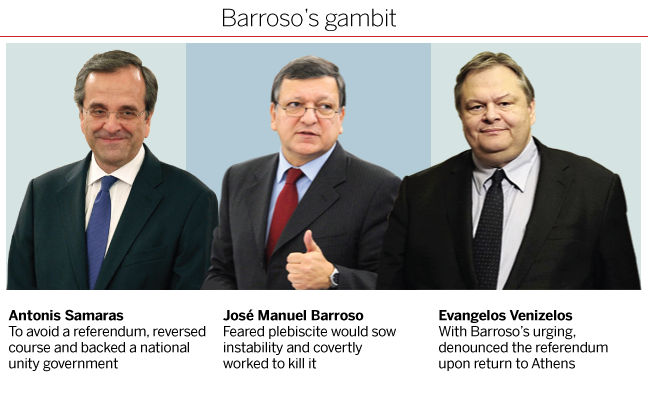
After brief remarks to the press in which he said the referendum would be “a question of whether we want to remain in the eurozone”, Mr Papandreou headed back to Nice airport. In the car, he turned to Mr Venizelos and said that things had not gone as badly as he had feared. Mr Venizelos was incredulous. As Mr Papandreou slept on the flight home, Mr Venizelos, emboldened by Mr Barroso’s admonition, ordered an aide to write up a statement to be released when they landed, at 4.45am on Thursday. “Greece’s position within the euro area is a historic conquest of the country that cannot be put in doubt,” the statement read. “This acquis by the Greek people cannot depend on a referendum.”
Mr Papandreou’s referendum was dead. As was his premiership.
‘A sign of weakness’
For months the Obama administration had been watching the eurozone crisis with frustration and mounting concern. Tim Geithner, the US Treasury secretary, and his team in Washington had tried to impart lessons learnt during their banking crisis – namely that only a huge wall of public money would calm panicked investors. Despite repeated high-profile European tours by Mr Geithner, and more discreet visits by his deputies, the Americans felt eurozone leaders still fell short.
In some quarters, the White House was suspected of playing politics. “The Americans had only one objective, which is fully understandable,” said one European who dealt directly with Mr Geithner. “The eurozone has to be saved because otherwise we’ll enter into a depression in Europe, and this will impact the economy of the US and my re-election.” US denials were not entirely believed in Europe.
The awkwardness was epitomised by Washington’s relationship with Ms Merkel, who occasionally found US intervention improper and unwelcome. Berlin had pushed for the Washington-based IMF to be part of the crisis response. But on occasions when Mr Obama weighed in, Ms Merkel would tell colleagues that European decisions should be made by Europeans.
Although the two leaders appear similarly cerebral and unemotional, people close to Ms Merkel say their styles are fundamentally different. Mr Obama can be professorial and lecturing, something Ms Merkel finds off-putting. Ms Merkel shuns such academic musings and is more short-term and tactical in her decision-making.
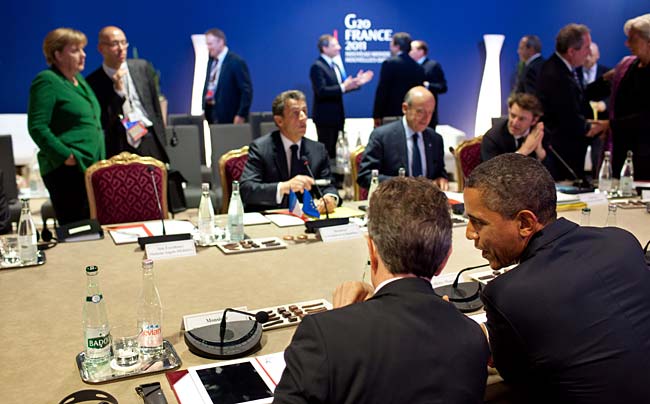 ©The White House
©The White House
US intervention: European leaders expressed surprise that Barack Obama was so engaged in the eurozone crisis
Still, many in Brussels, Frankfurt and Paris welcomed American intervention, particularly as a counterweight to Berlin. US officials say they were frequently dragged into crisis disputes by competing national capitals and urged to press the Germans to move more decisively. On other occasions, they say, the German government called on Washington to push struggling eurozone countries to implement promised reforms.
Regardless of whether European leaders welcomed US intervention, they felt Mr Obama was on top of the eurozone portfolio, something they found remarkable for a leader with so much on his plate.
[Obama taking charge] was a signal that Europe was not able to do it. It was a sign of weakness.’– German delegate
Yet when eurozone leaders were summoned again by Mr Sarkozy at 9.30pm that night in Cannes, several were surprised to find Mr Obama chairing the meeting. “It was strange,” said a member of the German delegation. “It was also a signal that Europe was not able to do that; it was a sign of weakness.”
Many in the room expected the evening to be dedicated to persuading Mr Berlusconi to accept IMF assistance. The Italians had rejected it that morning, arguing it would create the impression they could not handle the crisis on their own, while providing insufficient resources to deal with the fallout. They countered with an offer to accept IMF monitoring, but not funds.
But Mr Obama opened the session with something different. He had a new plan to increase the size of the eurozone firewall – an idea that put Germany front and centre.
The decision by Mr Sarkozy to cede the chair to Mr Obama, consciously or not, should not have come as a surprise. Since the outset of the crisis, Paris and Washington had almost identical recipes for solving it: a firewall of such size that no bond trader would question whether the eurozone had sufficient funds or political will to rescue the heavily indebted south.
To both Mr Geithner and his French counterparts, the most obvious source for that firewall was the ECB, which literally has the power to print money. The US had demonstrated the crisis-fighting power of a central bank when the Federal Reserve bought up huge tracts of Treasuries in the wake of Lehman Brothers’ collapse. But Berlin has long opposed using a central bank to fund governments.
It was a matter of principle
German opposition was rooted in its dark history: the hyperinflation of the interwar years that helped doom the Weimar Republic had been caused, in part, by central bank printing presses, which churned out marks to pay war reparations. At German insistence, the ECB had been modelled after the Bundesbank, which was given complete independence from meddling politicians when it was established in the 1950s, to avoid a repeat of the 1920s . The German government also demanded that the EU’s 1992 Maastricht treaty, which laid the foundations for the euro’s creation, bar the ECB from buying sovereign bonds.
Both Mr Geithner and Mr Sarkozy had spent months trying to solve two seemingly mutually exclusive problems: increasing the firewall enough to convince bond traders there was sufficient eurozone money to prevent a Greek default from being repeated elsewhere, while not falling foul of German objections.
On the eve of Cannes, US and French delegations agreed a new plan to increase crisis-fighting reserves they hoped would be acceptable in Berlin. It involved a form of cash known by few beyond the cognoscenti of international public finance: special drawing rights, or SDRs.
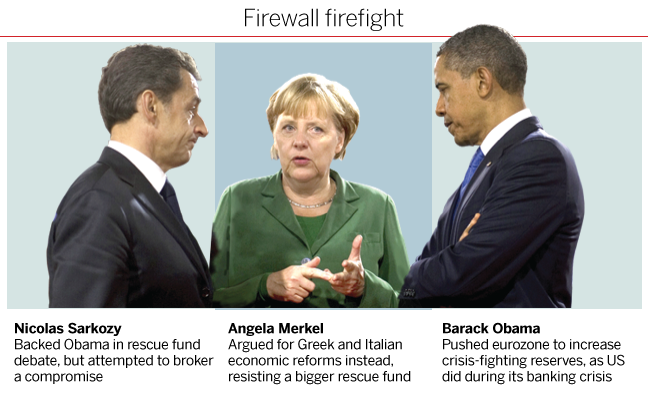
Technically, SDRs are not money. They are an asset created by international agreement in 1969 and held by the IMF for its member countries, a substitute for gold or US dollars in global financial accounting. Sometimes referred to as “paper gold”, they cannot be held by anyone other than the IMF and must be converted into another currency before they can be spent. And yet they have real value, with one SDR currently trading close to the value of one British pound.
In 2009, in the wake of the Lehman crisis, G20 leaders increased the amount of SDRs in existence by $250bn, essentially creating new IMF firefighting reserves out of thin air. At Cannes, the US and France wanted to do it again but instead of giving them to the IMF, the eurozone would devote €140bn in SDRs to its depleted bailout fund.
Our preference is that the ECB act a bit like the Federal Reserve did, but that doesn’t seem to be a viable option’– Barack Obama
Even those involved in drawing up the plan admit it was hastily thrown together. Back in that Obama-chaired meeting, the group found themselves enmeshed in German politics. “Our preference in the US is that the ECB should act a bit like the Federal Reserve did but that doesn’t seem to be a viable option,” Mr Obama said at the start, in a clear reference to German opposition.
But Ms Merkel now had another problem. Officials said she was open to Mr Obama’s idea. But SDRs are not controlled by national governments; they are controlled by central banks. And Jens Weidmann, the head of the Bundesbank, was opposed.
The Bundesbank, which is responsible for representing Germany at the IMF, had picked up word of the scheme through sources at the fund in Washington. Mr Weidmann had quickly drafted a letter to the German government outlining his objections. Mr Weidmann’s reasoning was both practical and ideological. Practically, the German central banker felt the plan smacked of desperation. Using foreign reserves to fill the bailout fund would send markets the wrong message: only through financial jerry-rigging could funding be found.
But more importantly to Mr Weidmann was the principle: SDRs are, like a country’s gold holdings, part of a government’s foreign reserves, which are the exclusive responsibility of the independent central bank to manage – not for politicians to commit willy-nilly to rescue programmes. The Bundesbank had no problem with the 2009 decision to increase SDRs for the IMF, since that is what SDRs were for. But committing them to the eurozone’s bailout fund set a dangerous precedent.
Mr Weidmann’s letter urged Ms Merkel to bury the proposal. But according to German officials, their delegation did not get the letter before leaving for Cannes. Instead, they only learnt of Mr Weidmann’s objection over the phone after they arrived in France, and then in a series of calls attempted to convince him to change his mind. It had become clear to Ms Merkel’s camp that they were about to be surrounded that morning during a bilateral meeting between the chancellor and Mr Obama in the cellar of the Palais. “The French, the Italians all would be willing to do this,” said a member of the German delegation.
But Mr Weidmann could not be moved.
So when Mr Sarkozy quickly endorsed Mr Obama’s idea at the evening session, and turned to Ms Merkel for her support, she delivered the bad news: the Bundesbank had rejected it and she could not agree without the Bundesbank. She supported the plan politically, and if Italy agreed to the €80bn IMF programme she may be able to go to the Bundestag to increase the size of the rescue fund itself. But on SDRs, the answer was no.
‘The storm was over’
To some in the room, the discussion seemed otherworldly. Although the eurozone was on the brink of imploding because of Greece and Italy, it was Ms Merkel – whose economy was the stalwart anchor of the continent – who had been cornered. Mr Obama had agreed with the Italians that the IMF programme was a bad idea. “I think Silvio is right,” Mr Obama said.
Mr Sarkozy attempted to manage the three-way impasse. The US wanted Germany to contribute its SDRs but Germany was only willing to give a partial commitment if Italy gave in on the IMF programme. Giulio Tremonti, Italy’s finance minister, held firm: Rome would accept IMF monitoring but no programme. Would the Italian monitoring plan, plus a commitment by Germany to contribute bilateral loans, be enough, Mr Sarkozy asked.
“No. Germany has one-fourth of all [eurozone] SDR allocations,” Mr Obama objected. “If you have all the EU countries together but not Germany . . . it starts losing credibility.”
Then came Ms Merkel’s tearful breakdown. “That is not fair. I cannot decide in lieu of the Bundesbank. I cannot do that.”
The emotional outburst appeared to temper the American and French demands for an agreement there and then. “He saw that he went too far,” one European in the room said of Mr Obama.
The US president asked whether Ms Merkel could work it out with the Bundesbank by Monday. Mr Sarkozy suggested finance ministers meet to agree the details before the summit ended the next day. Perhaps something vague could be mentioned in the summit’s communiqué, Mr Obama suggested. No, said Mr Sarkozy, but we could meet again in the morning.
It was as if the two men had not heard her. She made the point again: “I’m not going to take such a big risk without getting anything from Italy. I’m not going to commit suicide.”
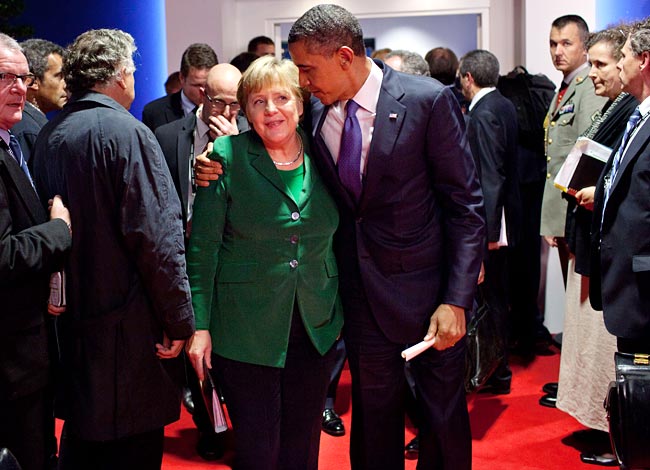 ©The White House
©The White House
Making up: Barack Obama attempts to comfort Angela Merkel after a fractious meeting
And with that, the meeting ended. Leaving the late-night session, Mr Obama put his arm around Ms Merkel as if to comfort her – a scene captured by the White House’s official photographer. The image adorned the walls of the West Wing for months.
The leaders met again the next morning but the momentum was gone. “The storm was over,” said one person at both meetings. The SDR plan would never again see the light of day. Italy would get a monitoring programme but no funding. And to compound the failure, Mr Berlusconi at his closing news conference publicly acknowledged what everyone had assiduously attempted to keep secret: that the IMF had offered him a rescue programme. Italy would suffer the stigma of needing a rescue but without receiving any assistance.
The Cannes failure provided new oxygen to the eurozone fire. When markets reopened, Italian borrowing costs soared. Within the week they would nearly touch 7.5 per cent. Greece’s would go above 33 per cent, a level almost without precedent for a developed country. Now, with no new firewall in place, it was unclear what would save the euro.
The next part of this series will be published late on Wednesday May 14
http://www.ft.com/cms/s/0/f6f4d6b4-ca2e-11e3-ac05-00144feabdc0.html?siteedition=uk#axzz31g55kBi9
[Read the second part of the article]

